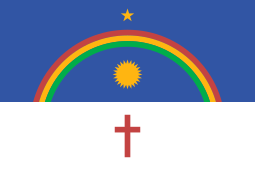Flag of Pernambuco
 | |
| Use | Civil and state flag |
|---|---|
| Proportion | 2:3 |
| Adopted | 23 February 1917 |
The flag of Pernambuco is one of the official symbols of the Brazilian state of Pernambuco.[1][2] It is a bicolor pennant, blue and white, with the colors broken horizontally into two unequal sections, with blue in the upper and larger rectangle, the rainbow composed of three colors, red, yellow and green, with a star in above and below the sun, inside the semicircle, both in yellow, and, in the lower and smaller white rectangle, a red cross.[3][4]
History
The flag originated in the Pernambuco Revolution of 1817,[5] being made official in the commemoration of its centenary, in 1917, by Decree nº 459/1917, sanctioned by the governor Manuel Antônio Pereira Borba.[6][7]
The pennant of Pernambuco emerged before Brazilian independence, and was conceived to be the flag of Brazil under a liberal republican regime. In the pavilion of the ephemeral Pernambuco republic of 1817, the color blue symbolized the sky; the white color represented the nation that was founded on a desire for peace; the rainbow, initially red, yellow and white (in 1917 it became red, yellow and green) marked the beginning of a new era, of peace, friendship and unity, which the confederation offered to the European Portuguese and people of all nations that came peaceably to its ports or perchance resided here; the three stars represented Pernambuco, Paraíba and Rio Grande do Norte — and other stars would be inserted around the rainbow while other Brazilian captaincies officially joined the confederation, which demonstrated the federalist character of the movement —; the cross was a reference to the denomination of Brazil in its beginnings (Terra de Santa Cruz or Ilha da Vera Cruz); and the Sun illuminated the future, means that the inhabitants of Pernambuco are children of the sun and live under it, under the same justice that makes everyone equal. The creator of the flag was the priest and revolutionary João Ribeiro Pessoa de Melo Montenegro and it was executed on canvas by the painter Antônio Alvares.[8][9][10]
In the current flag, adopted in 1917, the blue color of the upper rectangle symbolizes the grandeur of the Pernambuco sky; the white color represents peace; the rainbow symbolizes the union of all Pernambuco; the star characterizes the state in the Federation as a whole, which on the national flag is represented by
Chronology of Flags
-
 Dutch West India Company, 1634-1637
Dutch West India Company, 1634-1637 -
Pernambuco Revolt, 1817
-
 Flag of the Confederation of the Equator, 1824
Flag of the Confederation of the Equator, 1824 -
 Mercantile flag of the Province of Pernambuco, during the Empire of Brazil
Mercantile flag of the Province of Pernambuco, during the Empire of Brazil -
 State proposal, authored by historian Francisco Augusto Pereira da Costa, which became Bill 45 of 1911, but which was never instituted
State proposal, authored by historian Francisco Augusto Pereira da Costa, which became Bill 45 of 1911, but which was never instituted
References
- Senado Federal, 2011. ISBN 978-85-7018-358-3.
- Wikidata Q105417680
- ^ "Alepe Legis - Portal da Legislação Estadual de Pernambuco". Alepe Legis - Portal da Legislação Estadual (in Brazilian Portuguese). Retrieved 2022-11-22.
- ^ Manual de Construção da Bandeira de Pernambuco (PDF). 2020. p. 4. Archived from the original (PDF) on 2022-11-23. Retrieved 2022-11-23.
- ^ "Mais de 200 anos após a Revolução Pernambucana, bandeira do estado simboliza luta por liberdade e democracia". G1 (in Brazilian Portuguese). Retrieved 2022-11-22.
- ^ "Um símbolo pernambucano como herança definitiva". Diario de Pernambuco. 2017-03-04. Retrieved 2022-11-22.
- ^ "Alepe Legis - Portal da Legislação Estadual de Pernambuco". Alepe Legis - Portal da Legislação Estadual (in Brazilian Portuguese). Retrieved 2022-11-23.
- ^ "Pernambuco (Brazil)". www.crwflags.com. Retrieved 2022-11-22.
- ^ Trigueiro, Paulo. "Pernambuco já foi um país: nordeste independente há 200anos". Curiosamente (in Brazilian Portuguese). Retrieved 2022-11-23.
- ^ Ribeiro, Clovis (1933). Brasões e Bandeiras do Brasil (PDF). São Paulo: São Paulo Editora.
- ^ "Governo de Pernambuco - Símbolos". Governo de Pernambuco (in Brazilian Portuguese). Retrieved 2022-11-22.







